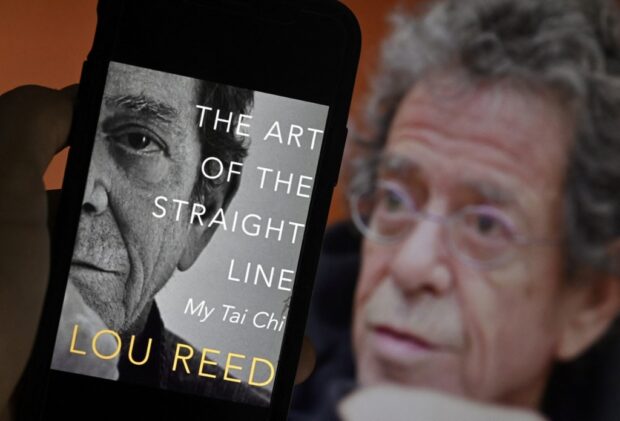
This illustration picture shows the new book of Lou Reed “The Art of the Straight Line, My Tai Chi” displaying on a smartphone with a picture of him in the background in Arlington, Virginia, on March 13, 2023. In 2009 the rock pioneer and poet Lou Reed started a book on what had become an art core to his lifestyle: tai chi. OLIVIER DOULIERY / AFP
NEW YORK—Rock pioneer and poet Lou Reed began writing a book in 2009 on an art at the heart of his lifestyle: tai chi.
But the project went unfinished, remaining a collection of scattered notes when the groundbreaking musical experimentalist died in 2013 aged 71, after complications from a liver transplant.
Those unpublished writings including conversations with his fellow artists, friends and tai chi practitioners come out this week, a decade after his death.
“He started it, we wanted to finish it,” Laurie Anderson, the composer and artist who was Reed’s longtime partner, told AFP.
“The Art of the Straight Line” features essays and riffs by Reed, a meditation on his three decades as a dedicated tai chi practitioner.
The ancient Chinese tradition helps reduce stress and anxiety and is often described as “meditation in motion,” according to the leading medical center Mayo Clinic.
The book offers insight into the gentler facets of the once hard-living Velvet Underground frontman, whose deadpan demeanor and cantankerous interactions with the press meant his testy side occupied a fair amount of the public’s attention.
“Not to get too flowery here but I want more out of life than a gold record and fame,” he wrote. “I want to mature like a warrior.”
“I want the power and grace I never had a chance to learn. Tai chi puts you in touch with the invisible power of, yes, the universe. Change your energy, change your mind.”
Reed fostered a long collaboration with Master Ren Guang Yi, studying for hours most days when he wasn’t touring.
He was so committed to the practice that he took his final breaths while “doing the famous 21 form of tai chi with just his musician’s hands moving through the air,” Anderson said at the time of his death.
Reed began studying tai chi in the 1980s when he was still heavily into drugs, according to Anderson.
The prolific artist behind classics including “Walk on the Wild Side” and “Sweet Jane” also penned the frank “Heroin,” an agitated depiction of the experience of using.
“Not the greatest time to start, but you know, what’s a bad time to start?” said Anderson, who was married to Reed at the time of his death.
“He was very, very persistent,” she said, referring to his tai chi practice. “He managed to keep going for decades and become very, very proficient.”
‘One big power chord’
Reed was not alone as a rock star who was into tai chi, but he was an early devotee when the ancient practice became popular in the United States.
“It’s all one big power chord in a certain way,” Anderson laughed, when asked how tai chi corresponded to rock. “They’re running along the same frequency.”
She recalled seeing members of Metallica do tai chi with Reed, adding that “they were very fascinated by it.”
The alt-rock icon and heavy metal band collaborated on the 2011 album “Lulu.”
“Lou was, like, kind of their grandmaster” both in terms of the record and “how to be kind of a grand old man,” Anderson said.
“These are no longer bad boys,” she said, explaining that tai chi “teaches you how to get old, in a country where old people are kind of made fun of.”
Releasing Reed’s writings on his beloved practice was a natural progression that followed his decades of promoting its benefits.
He “was not shy about talking to people about it,” Anderson said.
“He was looking at people going, ‘You have terrible posture. Have you ever done tai chi? You’re a wreck,'” she laughed.
“He did that to his surgeon before he’d done his liver transplant… this is the guy who’s just about to take a knife to him.”
But it came from a genuine desire to help, she said: “He was the most supportive person you can imagine.”
“He really wanted in every way to improve his life,” Anderson said. “It was really inspiring.”
“He was not someone who would sit around and mope about how bad things were.” /ra
RELATED STORIES:
‘Godfather of punk music’ Lou Reed dies; 71
Lou Reed poems after leaving Velvet Underground set for book
Library opens archive dedicated to rocker Lou Reed